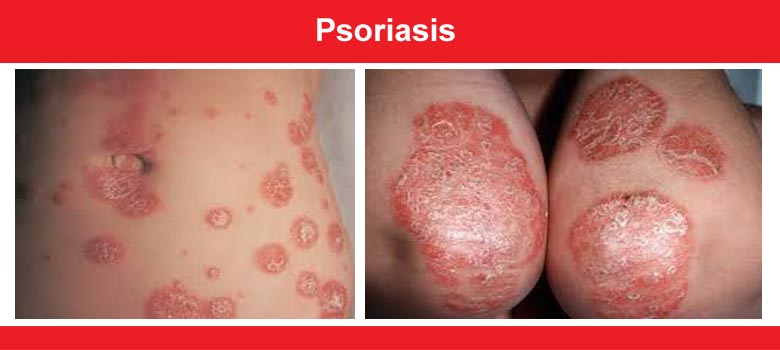
Psoriasis is an inflammatory skin condition in which red patches of various size develop on the skin covered with dry, silvery scales. There are five types, each with unique signs and symptoms. Between 10% and 30% of people who develop psoriasis get a related form of arthritis called “psoriatic arthritis,” which causes inflammation of the joints.
Psoriasis usually causes discomfort. The skin often itches, and it may crack and bleed. In severe cases, the itching and discomfort may keep a person awake at night, and the pain can make everyday tasks difficult.
Plaque psoriasis is the most common type of psoriasis. About 80% of people who develop psoriasis have plaque psoriasis, which appears as patches of raised, reddish skin covered by silvery-white scale. These patches, or plaques, frequently form on the elbows, knees, lower back and scalp.
The other types are guttate psoriasis (small, red spots on the skin), pustular psoriasis (white pustules surrounded by red skin), inverse psoriasis (smooth, red lesions form in skin folds), and erythrodermic psoriasis (widespread redness, severe itching, and pain).
Treatment depends on the severity and type of psoriasis. Some psoriasis is so mild that the person is unaware of the condition. A few develop such severe psoriasis that lesions cover most of the body.
Research shows that the signs and symptoms of psoriasis usually appear between 15 and 35 years of age. About 75% develop psoriasis before age 40. However, it is possible to develop psoriasis at any age. After age 40, a peak onset period occurs between 50 and 60 years of age.
Causes
Psoriasis is an immune-mediated condition. This means the condition is caused by faulty signals in the body’s immune system. It is believed that psoriasis develops when the immune system tells the body to over-react and accelerate the growth of skin cells. Normally, skin cells mature and are shed from the skin’s surface every 28 to 30 days. When psoriasis develops, the skin cells mature in 3 to 6 days and move to the skin surface. Instead of being shed, the skin cells pile up, causing the visible lesions. All types of psoriasis, ranging from mild to severe, can affect a person’s life.The people often feel frustrated. In some cases, psoriasis limits activities and makes it difficult to perform job responsibilities. Psoriasis occurs in both children and adults and may appear at any age, although it is most commonly diagnosed between the ages of 15 and 35. Both men and women of any race may be affected.
Treatment Procedure
We provide topical medicines which act as a moisturiser resulting in reduction of dryness & also oral medicines which reduce inflammation,remove built up scale,reduce skin turn over & clear affected skin of plaques.Together both of these help to normalise skin cell production. Just after starting our treatment patient get relief in itching within one or two months.Then after 3-4 months the lesions of psoriasis stops growing & falling of scales from skin stops. The treatment lasts 3-4 years which helps the cell to generate healthy new skin.

